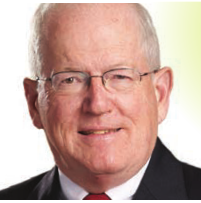Where are the experienced, well-known challengers?
The recent death of former New Hampshire 1st District Congressman Bill Zeliff was a loss to the state and the many friends of a fine, decent, hardworking businessman and representative.
Zeliff, who moved to New Hampshire to purchase and run the Christmas Farm Inn in Jackson and later was elected to three terms in the House before failing in an effort to become governor, was a moderately conservative Republican who was in the tradition of the majority of congressmen from both districts in New Hampshire during the 20th century.
When this writer began to be cognizant of politics in the mid-1960s, both of New Hampshire’s congressional districts were presumed to “belong” to the GOP. The 2nd District was one of the most Republican in New England. Perkins Bass held the seat for a decade before trying for the Senate in 1962, and James Cleveland held it for the next decade or so, even surviving the Johnson
landslide of 1964. Later, Charles Bass, son of Perkins, held the seat,
as did Charles Douglas for one term. Save for Douglas (who was raised in
Pennsylvania), all were Republicans who were from solid New Hampshire
families and all of whom had served in other offices prior to election
to Congress.
As the
GOP became more conservative, the 2nd District became purple with the
election of Democrat Richard Swett and, most recently, the repeated
victories of incumbent Ann McLane Kuster, a member of another
longstanding political family.
In
the 1st District, former Attorney General Louis C. Wyman was the
Republican incumbent when the Johnson landslide occurred, and he lost to
Laconia Mayor J. Oliva Huot, who was later ousted by Wyman in 1966.
After Wyman was succeeded by a Democrat in 1974, it later was reclaimed
by Republicans Bob Smith and then Jeb Bradley, before passing back and
forth between Carol Shea Porter, a Democrat, and Frank Guinta, a
Republican.
Lately,
with the election of Chris Pappas, the 1st District has seemingly been
in the hands of the Democrats, although it is more of a swing district
than the 2nd, and with redistricting underway, could be even more of a
swing district.
Which brings me to my point. Almost
exclusively, those challenging incumbents, regardless of their personal
qualities, have not been experienced, well-known or adequately funded.
Indeed, looking ahead to 2022, the GOP field in the 1st District seems
to be crowded with a failed candidate who moved to New Hampshire for the
sole purpose of running, a couple of kids in their 20s and the wife of a
former Massachusetts senator better known in the Bay State than here.
Most, if not all, of these probably would concede the district to the
Democratic candidate. Good elections have two strong, able candidates.
In
the 2nd District, if there is any interest, the names appear to be the
same as those who have failed to gain any traction in the past.
So
why is it that candidates like those in the past — experienced
businesspeople or those who have held office at the state level — have
not run for Congress, especially in Republican primaries, in recent
years?
A number of
explanations come to mind. First, as one former congressman said to me
during his first term, when the other party controlled the Congress, “I
am the least important person around. A freshman in the minority, who is
expected to do what leadership tells me to do, in an office no one can
find.”
Second, with
two-year terms, members of Congress are running for office all the time,
and spend significant amounts of time raising money for what have
become multimillion-dollar campaigns.
Third,
with the toxic atmosphere in Washington and a schedule that has members
flying to D.C. on Tuesday morning and flying home on Thursday afternoon
— only to attend functions or campaign in their districts all weekend —
it is reportedly a miserable existence.
Finally,
with the situation in both parties, but apparently worse in the GOP,
reasonable, moderate candidates do not face great prospects and often
decline to enter the fray. If this results in the best and the brightest
potential candidates declining to serve, or talented incumbents
deciding they have had enough, the situation will be dire for the
country.
Before it’s too late, think about who should be in Congress, and urge them to run!
Brad Cook is a Manchester attorney. The views expressed in this column are his own. He can be reached at bradfordcook01@gmail.com.